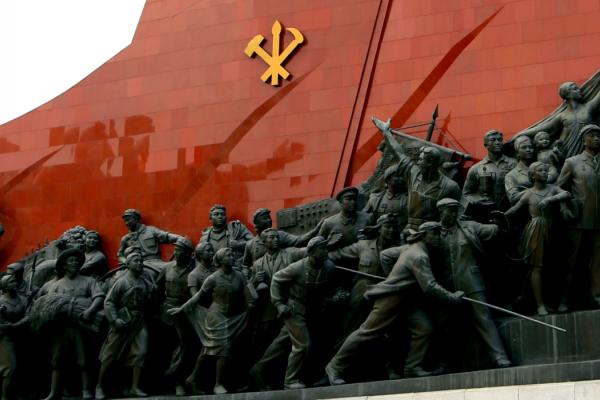NORTH KOREA'S hydrogen bomb test in September came as no shock to observers in South Korea. It was timed to protest the annual joint U.S.-South Korea military exercises. These “war games” are viewed by North Korea as a deadly provocation and as preparation for invasion and regime change.
The saber rattling and war of words by the U.S. and North Korean administrations reached a dangerous level this fall when President Trump, in his address to the U.N. General Assembly, threatened to “totally destroy” North Korea. To use such bellicose rhetoric at a forum that seeks political solutions to the world’s problems was particularly grave and reprehensible. It flies in the face of Christian values as well as the principles of universal human rights on which the U.N. is founded.
In September, U.S. planes crossed the demarcation that separates North and South Korea in the East Sea. In response, North Korea’s foreign minister, Ri Yong-ho, issued counterthreats to shoot down U.S. strategic bombers. Ri’s remarks betray North Korea’s fears of a pre-emptive strike by the U.S. and the “decapitation” of North Korea’s leadership. Since then the situation has gotten worse.
The U.S. press rarely sets U.S.-North Korea relations in a historical context. In the 1950s, U.S. forces visited utter devastation on North Korea during the Korean War. Nearly 5 million people were killed and thousands of towns laid to waste under systematic carpet bombing.
The Korean Catholic bishops wrote recently, “North Korea’s nuclear test is clearly a violation of United Nations Security Council resolutions. It is also an act of threat to peace in Northeast Asia, inciting the neighboring countries of Korea to nuclear armament.”
North Korea, however, was the first to propose a “freeze for freeze” solution, whereby it would suspend its nuclear program in exchange for a U.S. cancellation or reduction of large-scale joint military drills with South Korea. Civil society, including a broad base of church support, has constantly endorsed this strategy as the only means through which negotiations can occur and a viable political solution be achieved.
The U.S. policy of insisting that North Korea suspend its nuclear program as a precondition for dialogue has gotten us nowhere. Numerous sanctions imposed on North Korea over the years have emboldened North Korea’s leadership in inflicting hardship on its people with its “military first” policy and its quest to develop its nuclear program. The Korean Catholic bishops refer to the spread of nuclear armaments by anyone as an “act of evil” and condemn the arms race that has enveloped the Korean peninsula and wider regions to the detriment of human welfare.
South Korean President Moon Jae-in has fallen in step with the U.S. in supporting sanctions against North Korea, while striving to keep open a window for dialogue. However, recently President Moon has joined the U.S. in increasingly hard-line policies, including acquiescing to U.S. demands to beef up South Korea’s defense through the highly controversial deployment of the THAAD (Terminal High Altitude Area Defense) missile defense system. The THAAD installation in Seongju was met with massive civilian resistance, which was violently suppressed by 8,000 police. Religious groups strongly condemned the government’s response. Many felt betrayed by Moon, who was brought to power in the “candlelight revolution” and had espoused nonviolence principals and called for diplomatic engagement with North Korea.
Any miscalculation or misinterpretation by either side could set off nuclear annihilation. If political parties are not able to meet this challenge, then civil society and religious groups must step in to put the region on a path toward a permanent Korea peace treaty. We are on a knife’s edge.

Got something to say about what you're reading? We value your feedback!
